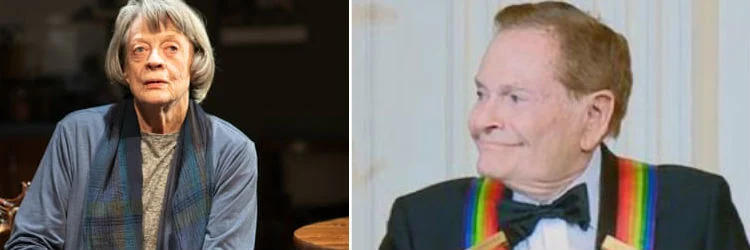
Friday Briefing: Reflecting on Jerry Herman, welcoming a new year of theatre and the role of critics
A new year, let alone a new decade, is always an opportunity to undertake some personal housecleaning, as we bid farewell to the past (that we are now powerless to change anyway) and invite new opportunities into our lives. In the past, these have involved plenty of new year resolutions - but mine, this year, is simply to let more positivity into my life.
For someone who lives my life to the frequent accompaniment of show tunes, few composers speak with more positivity and uplift than Jerry Herman, who actually died last week on Boxing Day, aged 88 (and amazingly some 34 years after he was diagnosed as HIV positive). A song of his that I want to adopt as my mantra for the start of 2020, is "Open a New Window", from his 1966 hit Mame, with its keen advice:
"Dance to a new rhythm
Whistle a new song
Toast with a new vintage
The fizz doesn't fizz too long
There's only one way to make the bubbles stay
Simply travel a new high way
Dance to a new rhythm
Open a new window
Ev'ry day!"
I finally saw that show for myself just last year, when Manchester's Hope Mill Theatre revived it in a fizzing production starring Tracie Bennett and Harriet Thorpe that will play at Northampton's Royal and Derngate from 7th-11th January, before visiting Salisbury Playhouse from 21st-25th January. (You can watch original Broadway star Angela Lansbury performing the song on the 1971 Tony Awards here.
It's striking what a difference positive attitude can make; that, and knowing where you fit into the world you inhabit. As Herman once told the New York Times, "I'm a happy man who writes the way I want to write. If I had the choice of being the most brilliant and sophisticated writer that ever came down the pike, or of being the simple melodic songwriter that I am, I would still have chosen the latter."
And as a result, he created a lot of pure happiness. Hello, Dolly! -- his biggest-ever hit from two years earlier than Mame, which was revived on Broadway in 2017 with Bette Midler in the title role -- is returning to the West End this year, in a brand-new production starring Imelda Staunton and directed by Dominic Cooke, who also directed her in Follies at the National Theatre. The show is one of the most joyful in the theatrical canon; no wonder that Wall-E, the title character of the trash compactor in the 2008 Pixar animated film living on a future, uninhabitable earth, watches 'Put on Your Sunday Clothes' and 'It Only Takes a Moment' from the 1969 film version of the musical obsessively.
And rather brilliantly, Wall-E's director Andrew Stanton had dinner with Michael Crawford, who sang "It Only Takes a Moment", after the film was released and found an amazing connection. As he told Entertainment Weekly, "[Crawford] said when he had to punch the very beginning of the song with the orchestra and say the phrase 'out there,' he was never getting it right, and finally [director] Gene Kelly had to come out of the booth and come over to him. [Kelly] said, 'Kid, you gotta sing this like it means more than the world. This is bigger than the universe, just think of the stars.' And the take that they used was the one where he was thinking of the stars when he sang 'out there.' So when he saw the opening of Wall-E and it was just this field of stars, it just blew his mind."
Closing the window on 2019
One of the ways that critics close the window on the last year is to choose our best (and sometimes worst) shows of the year. I did so here for musicals and here for plays.
In The Observer last weekend, Susannah Clapp - the theatre critic I most trust and enjoy reading - chose her own top shows of the year here. Rather shockingly, I discovered that I'd only seen two of her Top Ten myself (Cyrano de Bergerac and A German Life), as well as her Turkey of the year (David Mamet's Bitter Wheat); but I also wondered just how many of my own choices she'd seen in turn. She replied that she'd seen just two of my musical choices - my play ones weren't out yet when she wrote - but added, "Good though isn't it that theatre critics don't hunt in packs?"
And that's exactly right. We need to follow our own enthusiasms and passions, not necessarily be led by each other. But I freely admit and acknowledge the role that other critics can have in leading me to shows I might otherwise miss.
Adieu to Michael Billington (but not to musicals)
On which note, I must acknowledge the loss of the most consistent voice of theatrical criticism during my life as both a regular theatregoer and critic, namely the retirement - after some 48 years in the post - of Michael Billington as theatre critic of The Guardian. No, I didn't always agree with him, not least on musicals, which he often too casually characterises as "tune-and-toe shows". One of his final regular columns of the paper tried to put up a valiant defence for the current creativity of British musicals, though it ended by stating, "I don't see it as the prime function of the British theatre to supply Broadway with a chain of gold-plated, ready-made hits. I welcome the fact that the National Theatre, under Rufus Norris, is focusing on plays that reflect the state of the nation rather than seeking to explore the American musical back catalogue or search for potential commercial transfers. Musicals have an important place in the theatrical ecology. But plays are what really capture the temper of the times and it is when they start to dry up that I shall really worry."
British director Adam Lenson, who regularly works in the field of new musicals, wrote a long reply thread on Twitter, which he has also summarised in a blog post. As he points out, "While a certain type of musical flourishes here, we don't have the same rich ecosystem we do for plays and it definitely restricts the form compared to the US.... If Michael Billington doesn't believe that musicals "capture the temper of the times" then that that is often because the UK doesn't believe that they can. In fact they are often capable of a good deal more."
Photo credit: Helen Maybanks
Originally published on









